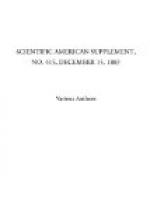An investigation among the patients in the insane department of the Berlin Charite Hospital, in charge of Prof. Westfahl, which was lately carried on by Dr. T. Galle (Uber die Beziehunger des Alcoholismus zur Epilepsie. Inaug. Dissert. 1881, Berlin), showed that among 607 patients who had entered the ward as epileptics or epileptic insane, 150 = 24.7 per cent. had been addicted to drink; 133 before, and 17 after the disease had shown itself; further, that of 1572 patients with delirium tremens, alcoholism, alcoholic dementia, and ebrietas, 243, or 15.4 per cent., were epileptic; and that in 221 intemperance was present before the outbreak of epilepsy; finally, that among 2679 patients which entered the department in six and a half years, 393, or 18 per cent., were inebriates and epileptics. Among 128 epileptics which I had occasion to note in the receiving institute, Plotseurie, 21 per cent. were drunkards and 20 per cent. were the offspring of intemperate parents.
If the list of injuries which intemperance, as we have seen, does directly to the mental life of man is a very considerable one, the baneful effect which is produced indirectly, by the intemperance of parents, upon the mental constitution of their progeny is surely just as great and disastrous. The children of intemperate parents frequently become drunkards themselves; they have inherited a degeneration of the vitiated constitution, and carry the stamp of this degeneration within themselves. The offspring of drunkards are not only weakly and sickly, and die early, especially of diseases of the brain, but, as Dahl, Morel, Howe, Beach, and others have shown, they are frequently born idiotic, or show early signs of insanity. Under the influence of alcohol, the individual constitution of the drinker becomes lowered and depraved, and, according to the law of inheritance, is transmitted through the progeny to the race.
Prof. Bollinger, the latest writer on inheritance of disease (Stuttgart, 1882—Cotta—Uber Dererbung von Krankheiten), names alcoholism among the transient abnormal conditions which, during conception, exert their influence, so that children of intemperate parents acquire pathological, and especially neuro-pathological, dispositions. Intemperance, says this author, in its acute, as well as in its chronic form, causes frequently pathological changes in the nervous system, and thus may the pathological differences in children of the same parents be partially explained. On account of the inheritance of a depraved and pathological constitution, the children of intemperate parents frequently suffer from an abnormal psychical organization. As in the progeny of insane, epileptics, suicides, and criminals, so also among the children of drunkards, do we see cases of congenital idiocy and imbecility, of neurasthenia and inebriety, of psychical and somatic degeneracy, also of depraved morality, of vagrancy and crime.
Mr. President and Gentlemen: In the light of the enumerated facts, nobody will dispute that intemperance is a fruitful as well as inexhaustible source for the increase and development of insanity; and that every effort toward diminution of the frequency of insanity, toward the prevention of mental diseases, must be directed against this widespread evil, intemperance.




